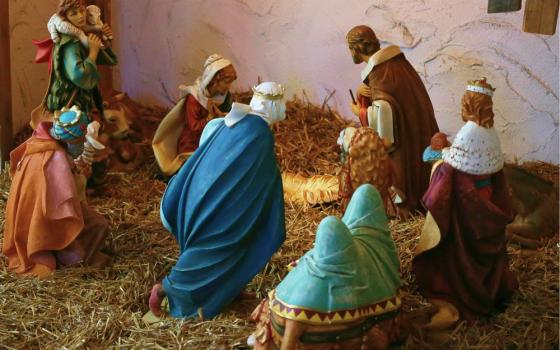Sitting next to me in another hard, plastic chair is a good-hearted man wearing brightly colored scrubs — colors that label him as guilty of a crime. We're in a florescent lit room inside the county jail: bare white walls and glass windows, a camera overhead.
There are about a dozen of us in this circle, praying with Advent Scriptures. Messages of waiting, anticipation, expectation are read aloud. Then we discuss, consider: What does it mean to be people of hope? How does hope influence their life inside these walls, even while separated from their children? O Come, O Come, Emmanuel.
At a glance, most observers might assume that I'm the only free person in the room. That as a visitor and minister, I'm able to enjoy liberty and live as I wish, in ways that align with the Gospel. But in the following days, the Spirit reminds me I'm not free.
After visiting the jail, I run an errand and pick up a donation of coffee for the spirituality center where I'm on staff. Wanting to express my gratitude to the business and be a good neighbor, I make a purchase. The cookie comes in a sheet of disposable plastic. The cup of coffee is also disposable, served in a Styrofoam cup with a plastic cover.
As I gobble up the cookie and gulp down the coffee with gladness, I barely think a thing of the impacts of my consumption. The coffee traveled thousands of miles so I could get a late-afternoon caffeine kick. How much energy did it take to grow the coffee, to brew it? To make the plastic sheet? The cup? All so I could enjoy a 10-minute break in my day, then dispose of waste that will never decay, that will remain on Earth forever? O Come, O Come, Emmanuel.
In the jail, a man read the Word of God aloud to us. We held our crinkled white pages in our hands as we listened. I thought of how I didn't know the people with me in the room too well, and they didn't know me. Yet, we are bound by our shared humanity, our shared struggle to become better people.
Be patient, therefore, brothers, until the coming of the Lord. See how the farmer waits for the precious fruit of the earth, being patient with it until it receives the early and the late rains. You too must be patient. Make your hearts firm, because the coming of the Lord is at hand. Do not complain, brothers, about one another, that you may not be judged. Behold, the Judge is standing before the gates. Take as an example of hardship and patience, brothers, the prophets who spoke in the name of the Lord.
—James 5:7-10
I told the men that I'm a sinner too. I admitted I get frustrated with people when they don't do things like I think they ought to be done. I asked them to pray for me, so that I can better heed the words of Scripture and not judge my neighbors, not complain. I know I'm called to embrace diversity, to be patient, to love. But I fail every day. Later, I'm judgmental — and practically furious — when another member of my parish wants to convince me that Pope Francis is wrong, that capitalism is good and that climate change is a sham. O Come, O Come, Emmanuel.

Days later, I am watching "60 Minutes" with my housemates. It's an occasional Sunday night dinner ritual: We consume our locally-sourced homecooked meal right along with an expansion of global consciousness. This time, the main course seems to be the horror of the plastics in the ocean. I feel sick as I learn how remote beaches are littered with garbage that has floated there from across the globe, from places thousands of miles away. I see pictures of the world's garbage swirling in the water like a bizarre chemical soup. I see images of dead birds, their flesh and skeletons, decaying — in the gaps that would have been their bellies are piles of brightly colored plastic.
Later that night, it crosses my mind: I don't know how to go through my day without using plastic. I use a plastic toothbrush, a plastic rosary, a plastic light switch. All my cosmetics come in plastic containers. I brush my hair with plastic. I wear plastic glasses. I even use a plastic lighter to ignite the candle in my prayer corner. Plastic has always been part of my life. I don't know how to resist this system, how to strip myself from cooperation with the evil of waste and destruction. O Come, O Come, Emmanuel.
At times, our consciousness of systemic problems can be overwhelming. We call feel frozen in our fear, we are stalled from responding with compassion. We can feel powerless, trapped. We may decide to ignore the issues or convince ourselves we bear no responsibility. It's easy to doubt and become cynical: How could each of us possibly cause a positive change, when the problems are so immense? When the problems of this planet are complex and enormous, it is easy to become numb, still. It is natural to ignore and continue onward in our comfort zones, without our lifestyles and hearts and minds being disturbed.
Despite our opposition, we participate in the oppression, hurting other people and the planet. The systems of our global society hold us all prisoner. Not one of us is completely free. But we are made to be each other's keepers, God made us for each other. We are all called to communion with the goodness of creation, even the seabirds who die on beaches, their bellies full of plastic. O Come, O Come, Emmanuel.
In the jail, the man sitting next me in another hard, plastic chair speaks about what it's like to be locked inside, and how he remains hopeful. His face is kind, encouraging. I am learning to be patient and humble. I am more deeply understanding what these words mean.
O Come, O Come, Emmanuel.
[Now on staff at Marywood Franciscan Spirituality Center in northern Wisconsin, Julia Walsh is a Franciscan Sister of Perpetual Adoration, a Catholic youth minister, a committed social justice activist, and a graduate of Catholic Theological Union. Her award-winning writing has appeared in America, Global Sisters Report, Living Faith, and PILGRIM Journal. Visit her online at messyjesusbusiness.com and follow her on Twitter @juliafspa.]

